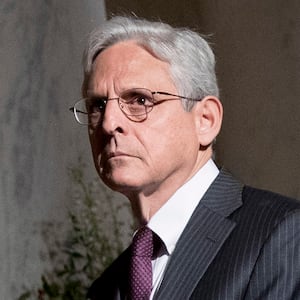Someone is targeting Biden Justice Department nominees Vanita Gupta and Kristen Clarke with attacks. Why? Both nominees hold exceptional records as litigators and civils rights activists. The respect they’ve earned extends beyond the civil rights movement and progressives to law enforcement and leading conservatives. They ought to be consensus picks.
But pull back the curtain, and strategy and motive take shape. Gupta and Clarke are poised to use their skills to defend Americans’ right to vote, just as the Republican Party is going all in on voter suppression as its path to political victory in 2022.
Unraveling the strategy starts with the dark-money group running the ads: the so-called Judicial Crisis Network (JCN). This group’s ordinary work has been to translate big donors’ money into political attack ads in the “Court capture” mission that set out to remake the Supreme Court to the donors’ advantage. JCN has placed more than 10,000 ads since 2012 in pursuit of that mission, and they’ve kept secret the identity of those big donors.
ADVERTISEMENT
In Donald Trump and Mitch McConnell’s court-packing machine, this Judicial Crisis Network spent $7 million to oppose President Obama’s Supreme Court nominee Merrick Garland, and then spent another $10 million to boost Trump’s nominee Neil Gorsuch. JCN pledged $10 million or more for Brett Kavanaugh’s nomination. It spent $10 million in under two months to support Amy Coney Barrett’s bid. These campaigns were funded with tens of millions of anonymous dollars, primarily through four separate donations of at least $15 million. Those donations may well have been the same donor.
Eye-popping as that is, those millions are a tiny slice of the funding behind the overall dark-money operation. A 2019 Washington Post investigation revealed JCN is one of a web of front groups coordinated by Leonard Leo, the long-time executive vice president of the Federalist Society. The Post tracked more than $250 million in dark money flowing through Leo’s groups.
The groups see to the grooming and selection of reliable nominees, the lobbyists needed to shepherd nominees through confirmation, and the attack ads to motivate the confirmation votes. Then, more groups lobby the selected judges through amicus curiae briefs, signaling how their donors want the judges to rule.
The dark-money network has won an avalanche of victories for its donors. There are 80 partisan, 5-4 Supreme Court decisions that limit workers’ rights and access to reproductive health care, erode environmental protections, block commonsense gun safety laws, undermine civil rights, and protect corporations from courtrooms. It is an astounding 80-0 rout for big right-wing donors.
After The Washington Post exposed the $250 million operation, Leo stepped back from his Federalist Society role and turned up at a new organization improbably named the Honest Elections Project. This project began voter suppression work in political swing states like Florida, Nevada, Wisconsin, and Michigan that included: negative ads against Democrats; threatening letters to election officials challenging voter rolls; and a barrage of lawsuits seeking voting restrictions for November’s election.
The media soon uncovered that the Honest Elections Project was a rebrand of the Judicial Education Project—which shared connections, donors, and aims with its sister group — yes, the Judicial Crisis Network. As a reporter for The Guardian observed, the Honest Elections Project melds two goals of the right-wing dark-money operation: first, pack the federal judiciary; and second, bring voting rights cases before the packed courts. Rigging elections through the courts is now a Republican judicial priority.
This brings us back to Gupta and Clarke. Gupta once ran the Civil Rights Division. She prosecuted hate crimes and human trafficking, promoted disability and LGBTQ rights, and fought discrimination in education, housing, employment, lending, and religious exercise. But most important, she challenged voter suppression. Gupta, if confirmed as assistant attorney general, will supervise the Civil Rights Division she once ran.
Accomplished civil rights attorney Clarke will fill Gupta’s former role running the Division and enforcing voting rights. The Honest Elections Project, kin to the Judicial Crisis Network, wants no part of these two women, because they will be strong, motivated leaders against unlawful voter suppression. They preferred Trump’s Civil Rights Division, which didn’t bring one single Voting Rights Act case until late May of 2020.
That’s the motive. The donor-approved Republican appointees to the Supreme Court may handcuff the Civil Rights Division with further judicial assaults on voting rights. But Trump’s cronies at the Justice Department showed dark-money donors the value of a captive Department that would look away from voter suppression schemes. As Republicans hinge their election strategy on keeping Americans from voting, an active Civil Rights Division is a deadly threat.
I get it. If I were a right-wing special interest group, the last thing I would want is these two experienced lawyers wielding the power of the Justice Department to defend voting rights. But for everybody else, these women are two appointments to applaud.







